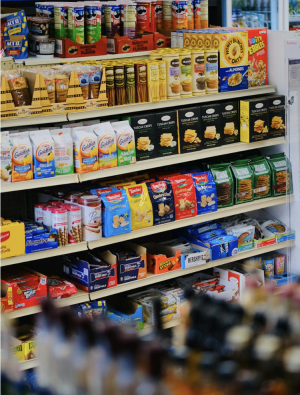Are these everyday foods secretly hurting your health? What science now says about ultraprocessed items
By
Veronica E.
- Replies 0
Disclaimer: The information provided in this article is for educational purposes only and is not intended as a substitute for professional medical advice, diagnosis, or treatment. Always consult your physician or other qualified healthcare providers with any questions you may have regarding a medical condition or before making any changes to your health regimen.
You’ve probably seen the term “ultraprocessed foods” tossed around in health articles, but what does it actually mean—and should you be worried?
These foods often come in flashy packaging and contain long ingredient lists filled with additives you wouldn't normally cook with at home.
They're designed to be tasty and convenient, but growing evidence suggests they may come with hidden health risks.
For older adults especially, understanding what’s in these foods—and how they affect the body—can make a big difference.
The good news is, you don’t have to give them up entirely, but a little knowledge can help you make better choices at the grocery store.

What exactly are ultraprocessed foods?
Ultraprocessed doesn’t just mean “frozen” or “from a box.”
These foods are made in factories using ingredients rarely found in home kitchens—like protein isolates, emulsifiers, artificial sweeteners, and flavor enhancers.
They’re built for shelf life, portability, and mass appeal.
As registered dietitian Vanessa Rissetto explains, they’re designed to be “addictive, with lots of added sugar, fat, and salt.”
This explains why it’s easy to overeat items like potato chips, packaged cookies, or sweetened drinks—they’re engineered that way.
Also read: Are you eating this popular food? Doctors say it could be linked to Parkinson’s disease
Which ultraprocessed foods are the worst offenders?
While not all ultraprocessed foods are equally unhealthy, certain categories have raised particular concern among nutrition experts.
At the top of the list are sugary drinks—like soda, sweetened tea, and fruit-flavored beverages—and processed meats, including hot dogs, chicken nuggets, deli meats, and fish sticks.
Other frequent culprits include:
These items often have long ingredient lists filled with additives, preservatives, and artificial flavorings, with little in the way of fiber or nutrients.
Also read: The surprising link between your personality and food cravings
But not all ultraprocessed foods are created equal
Some foods that technically count as ultraprocessed may not be harmful—and could even offer some health benefits, depending on the ingredients.
Items like high-fiber breakfast cereals, plain popcorn, or low-sugar yogurts are examples of processed options that can still fit into a balanced diet.
As with many things in nutrition, it comes down to the quality of the ingredients and how much you’re eating.
Also read: Is processed meat riskier than soda? Here’s what new research says about your diabetes risk
Other health concerns tied to ultraprocessed diets
While heart health often gets the most attention, ultraprocessed foods may affect more than just your arteries.
Research has suggested links between heavy consumption of these items and conditions like obesity, liver issues, and digestive problems.
Some studies also note an association with mental health concerns, including increased rates of depression, anxiety, and poor sleep—possibly due to blood sugar spikes and low nutrient content.
Also read: Another danger of ultra-processed food: The bone disease link
Trying to manage your weight? Minimally processed foods may help
Even when calories and nutrients are matched, diets that focus on minimally processed foods appear to be more effective for weight loss, reducing cravings, and improving energy.
People on these diets often report feeling fuller and more satisfied, which can help with long-term success.

Also read: Are microplastics in junk food quietly affecting your brain? Here’s what the research says—and what you can do about it
How to keep processed foods in check
The goal isn’t to eliminate ultraprocessed foods completely—it’s about balance.
Nutrition experts suggest that most of your daily meals should come from whole or minimally processed sources, leaving room for occasional convenience items or treats.
A good rule of thumb is the 85/15 rule: aim for about 85% of your food to be nutrient-dense and unprocessed, and allow 15% for flexibility.
Also read: A major food brand is changing its recipes—what YOU should know about synthetic additives
Smart strategies for cutting back
Here are some realistic ways to eat fewer ultraprocessed foods—without giving up the things you enjoy:
Ultraprocessed foods are everywhere, but with a little awareness, it’s possible to enjoy what you love while still making healthier choices.
You don’t need to aim for perfection—just balance, variety, and a closer look at what’s really in your food.
Whether you’re shopping for snacks or planning meals at home, small changes can go a long way in supporting your long-term health.
Read next: The truth behind why junk food is more affordable than healthy food–Is it worth the extra expense?

Have you started cutting back on ultraprocessed foods? Do you feel a difference in your energy, digestion, or mood? Or maybe you’ve found healthy swaps that work well for your routine?
Share your story in the comments—your experience could help someone else take the next step toward healthier habits.
You’ve probably seen the term “ultraprocessed foods” tossed around in health articles, but what does it actually mean—and should you be worried?
These foods often come in flashy packaging and contain long ingredient lists filled with additives you wouldn't normally cook with at home.
They're designed to be tasty and convenient, but growing evidence suggests they may come with hidden health risks.
For older adults especially, understanding what’s in these foods—and how they affect the body—can make a big difference.
The good news is, you don’t have to give them up entirely, but a little knowledge can help you make better choices at the grocery store.

Many popular grocery items fall into the ultraprocessed category—knowing which to choose (and avoid) can help. Image Source: Pexels /
Sulav Jung Hamal.
Sulav Jung Hamal.
What exactly are ultraprocessed foods?
Ultraprocessed doesn’t just mean “frozen” or “from a box.”
These foods are made in factories using ingredients rarely found in home kitchens—like protein isolates, emulsifiers, artificial sweeteners, and flavor enhancers.
They’re built for shelf life, portability, and mass appeal.
As registered dietitian Vanessa Rissetto explains, they’re designed to be “addictive, with lots of added sugar, fat, and salt.”
This explains why it’s easy to overeat items like potato chips, packaged cookies, or sweetened drinks—they’re engineered that way.
Also read: Are you eating this popular food? Doctors say it could be linked to Parkinson’s disease
Which ultraprocessed foods are the worst offenders?
While not all ultraprocessed foods are equally unhealthy, certain categories have raised particular concern among nutrition experts.
At the top of the list are sugary drinks—like soda, sweetened tea, and fruit-flavored beverages—and processed meats, including hot dogs, chicken nuggets, deli meats, and fish sticks.
Other frequent culprits include:
- Packaged snacks like chips, pretzels, and candy
- Frozen meals such as ready-to-heat pizzas and fries
- Refined grain products like white bread, sugary cereals, and baking mixes
- Sweetened dairy desserts like flavored yogurts, pudding cups, and ice cream
These items often have long ingredient lists filled with additives, preservatives, and artificial flavorings, with little in the way of fiber or nutrients.
Also read: The surprising link between your personality and food cravings
But not all ultraprocessed foods are created equal
Some foods that technically count as ultraprocessed may not be harmful—and could even offer some health benefits, depending on the ingredients.
Items like high-fiber breakfast cereals, plain popcorn, or low-sugar yogurts are examples of processed options that can still fit into a balanced diet.
As with many things in nutrition, it comes down to the quality of the ingredients and how much you’re eating.
Also read: Is processed meat riskier than soda? Here’s what new research says about your diabetes risk
Other health concerns tied to ultraprocessed diets
While heart health often gets the most attention, ultraprocessed foods may affect more than just your arteries.
Research has suggested links between heavy consumption of these items and conditions like obesity, liver issues, and digestive problems.
Some studies also note an association with mental health concerns, including increased rates of depression, anxiety, and poor sleep—possibly due to blood sugar spikes and low nutrient content.
Also read: Another danger of ultra-processed food: The bone disease link
Trying to manage your weight? Minimally processed foods may help
Even when calories and nutrients are matched, diets that focus on minimally processed foods appear to be more effective for weight loss, reducing cravings, and improving energy.
People on these diets often report feeling fuller and more satisfied, which can help with long-term success.

Experts recommend limiting sweets high in refined sugar and preservatives for better long-term health. Image Source: Pexels / Nataliya Vaitkevich.
Also read: Are microplastics in junk food quietly affecting your brain? Here’s what the research says—and what you can do about it
How to keep processed foods in check
The goal isn’t to eliminate ultraprocessed foods completely—it’s about balance.
Nutrition experts suggest that most of your daily meals should come from whole or minimally processed sources, leaving room for occasional convenience items or treats.
A good rule of thumb is the 85/15 rule: aim for about 85% of your food to be nutrient-dense and unprocessed, and allow 15% for flexibility.
Also read: A major food brand is changing its recipes—what YOU should know about synthetic additives
Smart strategies for cutting back
Here are some realistic ways to eat fewer ultraprocessed foods—without giving up the things you enjoy:
- Prep ahead: Batch-cook lean proteins, beans, and grains so you always have something ready.
- Snack differently: Choose fruit, nuts, or plain popcorn instead of packaged snacks.
- Switch up breakfast: Try plain oatmeal or Greek yogurt with fresh fruit instead of sugary cereals.
- Read the label: Look for shorter ingredient lists with fewer added sugars, oils, or artificial ingredients.
- Cook simple meals at home: Even a quick stir-fry or roasted veggies can beat most frozen meals.
Ultraprocessed foods are everywhere, but with a little awareness, it’s possible to enjoy what you love while still making healthier choices.
You don’t need to aim for perfection—just balance, variety, and a closer look at what’s really in your food.
Whether you’re shopping for snacks or planning meals at home, small changes can go a long way in supporting your long-term health.
Read next: The truth behind why junk food is more affordable than healthy food–Is it worth the extra expense?
Key Takeaways
- Experts warn that frequent consumption of ultraprocessed foods—especially sugary drinks and processed meats—can negatively affect long-term health.
- Not all ultraprocessed foods are equally harmful; some cereals, yogurts, and snacks can still be part of a healthy diet if chosen carefully.
- Many ultraprocessed items are high in sugar, salt, and additives, and low in fiber, which may contribute to weight gain and poor nutrition.
- Nutritionists recommend aiming for a mostly whole-foods diet while allowing room for occasional convenience items or treats.
Have you started cutting back on ultraprocessed foods? Do you feel a difference in your energy, digestion, or mood? Or maybe you’ve found healthy swaps that work well for your routine?
Share your story in the comments—your experience could help someone else take the next step toward healthier habits.






